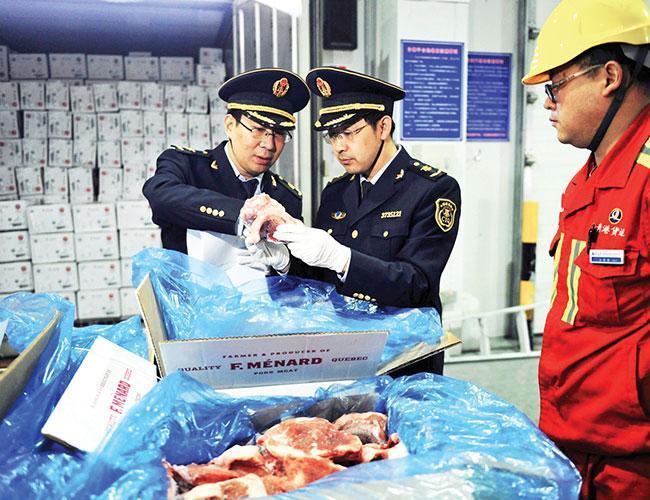
The U.S. and China’s top economic officials agreed by phone on March 24 to “continue to communicate” on trade issues, Chinese state media said, as President Donald Trump pledged his escalating trade showdown would get results despite pushback from Europe and Beijing.
In his latest jolt to the prevailing global order, Trump on March 22 authorized tariffs on as much as $60 billion of Chinese imports, targeting sectors in which Washington says China has stolen American technology.
Liu He, the Chinese vice premier in charge of the economy, told U.S. Treasury Secretary Steven Mnuchin on March 24 that Beijing was “ready to defend its national interests” but hoped that “both sides will remain rational and work together,” according to China’s official Xinhua news agency.
He also accused a U.S. probe into Chinese intellectual property practices of violating international trade rules.
China had warned the United States on March 23 that it was “not afraid of a trade war” as it threatened tariffs on $3 billion worth of U.S. goods in retaliation.
And French President Emmanuel Macron said Europe would respond “without weakness” to Washington’s threats of tariffs on steel and aluminum.
“Nothing should be addressed when it is with a gun to your head,” he said at the end of an EU summit in Brussels.Global stocks have plummeted as fears rise that the confrontation could provoke a damaging trade war.
Meanwhile, World Trade Organization Director-General Roberto Azevedo called for cooler heads to prevail, saying in a statement that new trade barriers would “jeopardize the global economy.”
But speaking to reporters on March 23 as he signed new budget legislation, Trump said his efforts were beginning to bear fruit.
Washington this week said it would temporarily exempt Europe as well as countries including Brazil, Argentina, South Korea and Australia from the steep new steel and aluminum tariffs that Trump unveiled this month and which took effect on March 23.
European and U.S. trade officials said this week they were beginning talks to reach a compromise.
“Many other countries are now negotiating fair trade deals with us,” Trump said on March 23.
“Part of the reason, frankly, that we’re able to do that is the fact that we have the tariffs on steel and the tariffs on aluminum.”
US, S Korea ‘reach deal in principle’South Korea and the United States have reached an understanding on revising their free trade agreement (FTA) and on steel tariffs, Seoul’s trade minister said on March 25.
“Agreement on the bilateral FTA and steel issues has been reached in principle,” Kim Hyun-chong said on arrival at Incheon International Airport after talks in Washington, Yonhap news agency reported.
Some technical issues need to be settled at working level but are likely to be concluded shortly, the minister was quoted as saying.U.S. officials had said on March 23 an agreement could be announced in the coming week.
But Beijing on March 23 also unveiled a hit list of products that could face duties of up to 25 percent, from fresh fruit to pork and wine, though it stopped short of pulling the trigger as it indicated its readiness to negotiate an agreement.
China’s commerce ministry warned that a 15 percent tariff on 120 goods worth almost $1 billion -- including fresh fruit, nuts and wine -- would be imposed if the U.S. fails to reach a “trade compensation agreement” within an unspecified time frame.
In a second step, a 25 percent tariff would be imposed on eight goods totaling nearly $2 billion, including pork and aluminum scrap, after “further evaluating the impact of the U.S. measures on China,” the statement said.
The list noticeably does not include soybeans, a key U.S. export from Trump-voting states that Chinese state-run newspaper the Global Times had suggested should be targeted by Beijing.
On March 24, the deputy director of China’s International Economic Exchange Center and former vice minister of commerce Wei Jianguo told the China Daily newspaper that Beijing was already preparing two more such lists, potentially set to include other products like aircraft and microchips.
Tourism and other sectors besides commodities might also be hit, he added.
The United States had a record $375.2 billion goods trade deficit with China last year.